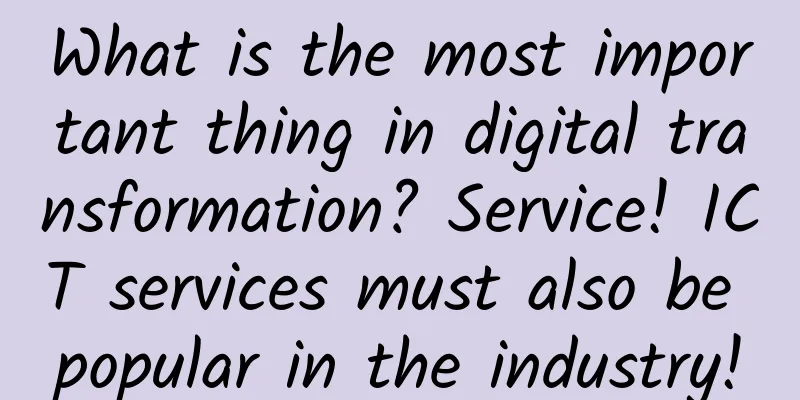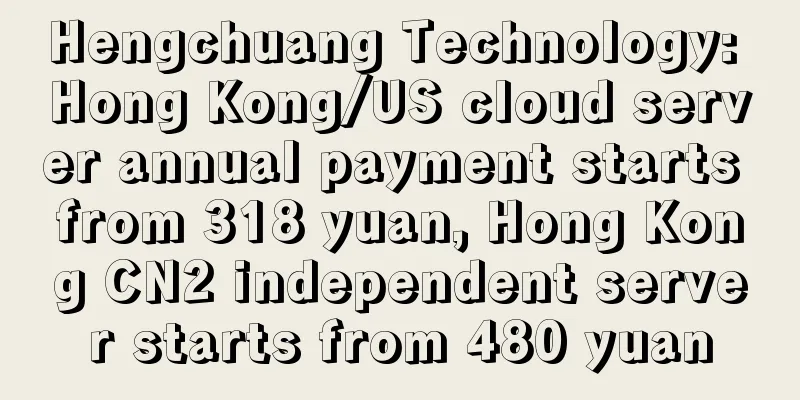What is the most important thing in digital transformation? Service! ICT services must also be popular in the industry!

|
51CTO conducts dozens of procurement surveys for different companies every year. In the question "What factors do you value most in a product?", the proportion of "service" being "selected" by the survey respondents has always remained high, which shows how much users value service. Having said that, many manufacturers have suffered a lot from the pit of "focusing on sales and neglecting delivery", and customers often doubt whether they have "bought a fake solution"? The reason is that what customers need is no longer a simple box-type product, but a comprehensive solution that includes planning, design, implementation, operation and maintenance to improvement. This actually poses a problem for manufacturers, because few manufacturers' product solutions can meet so many user needs. Without Nezha's three heads and six arms, all manufacturers can do is "group together and help each other". Since Huawei launched the "big service" strategy at the China Partner Conference in 2013, how has the young seedling of "big service" grown? A few days ago, using the platform of Huawei China Ecosystem Partner Conference 2017, the reporter interviewed a number of ecological partners including Huawei in one go. From each of their different perspectives, the reporter restored the most authentic service ecosystem construction map under Huawei's "big service" goal.
100 million yuan invested in service platform Huawei's emphasis on service exceeds the reporter's imagination. On the afternoon of March 9, Huawei held a ceremony to award the first batch of certified service solution partners CSSP in China, and the first batch of representatives were certified. Li Tongguang, Vice President (Delivery and Service) of Huawei Enterprise BG China, said that Huawei will develop about 60-70 CSSPs in 2017 and invest more than 100 million in service platform and capacity building in China. Why does Huawei attach so much importance to service? Li Tongguang said that users face many problems in digital transformation. For example, to build a cloud data center, it is not just about purchasing equipment, but also requires service providers to provide a systematic planning and design to tell users how to migrate their business, how to operate and maintain it in the future, and how to operate it. "This is a very obvious change in user needs. The more scattered and unsystematic the service needs are, the more they need us to provide a package of solutions and overall IT management services. This year we will continue to implement service standardization." He also gave an example of a provincial-level government cloud project. After all government affairs were migrated to the cloud, the operation and maintenance personnel found that the cloud carried more than 50 business systems. The operation and maintenance pressure was far from comparable to the past chimney-style IT architecture era. They needed a service provider to help them design the operation and maintenance system of the cloud data center, and then a professional team to help them with daily operation and maintenance, so as to free up more time for business operations. How to create a hot-selling industry service? Xiong Weijun, Director of Huawei Enterprise BG Service Marketing and Solution Sales Department, revealed that Huawei has always adhered to the strategy of giving equal importance to technical support and industrial operation, consolidating technical support and aggregating partners to achieve rapid growth. To consolidate technical support, Huawei has mainly done two things: First, from the perspective of technical support, Huawei has continuously optimized its delivery model, including building a global one-stop multi-service remote delivery platform GSC, and establishing a new industry-oriented operational system to improve delivery efficiency. Currently, three large GSCs have been built in China, Romania, and Mexico to serve all customers around the world, covering more than 170 countries and achieving global coverage of all languages including Russian, French, etc. Second, the global GSC has expanded from just covering technical support to covering four major functions: technical support, remote delivery, remote operation and maintenance, and channel-oriented marketing and technical support, which has greatly improved the overall delivery efficiency for the industry. In the future, the GSC platform will also be open to channels to support the improvement of the basic guarantee capabilities of ecological partners. Huawei has also sorted out its ideas on how to ensure high growth of enterprise services in the future. Xiong Weijun said that from a growth perspective, Huawei will work around three main lines. First, from the perspective of technical services, we will continue to develop new software subscription models and intelligent basic services, including big data, analytical tools and targeted distribution of business opportunities, distribute business opportunities to customers and channels, and realize the added value of intelligent services. Secondly, the delivery of new technologies and new models has emerged, such as ICT infrastructure design and implementation services, cloud enabling services, software and middleware services, as well as end-to-end cloud planning, cloud design migration, cloud disaster recovery, cloud security, etc. Huawei will work with its ecosystem partners to open up new growth space. ***, Huawei must implement the core concept of strengths sharing and capability opening, and build joint service solutions with partners based on customers' industry needs in the dimension of industry solutions. Ecological partners are both witnesses and beneficiaries Huawei's service strategy has been recognized by its partners. "When delivering products to Chinese customers, they have many personalized needs, and one manufacturer cannot meet all of their needs. Therefore, we not only agree with Huawei's concept of ecological partnership, but we are also beneficiaries ourselves." Beijing Advanced Digital Communications Information Technology Co., Ltd. (abbreviated as: Advanced Digital Communications) has its main customer base concentrated in the financial industry. Vice President Jin Lin said that the cooperation with Huawei has a long history. There was once a bank that needed to cloud its transactions and improve the bank's service capabilities in all aspects based on cloud technology. Advanced Digital Communications was very cautious about this because the transaction system needs a strong support platform. After several considerations, they chose to cooperate with Huawei, which received a very good response from customers and gradually deepened their cooperation in the fields of cloud and big data. Among Huawei's partners, Digital China Group, as a strategic partner, has a better understanding of the service. Han Zhimin, assistant president of Digital China and general manager of Huawei headquarters, revealed that Digital China joined the Huawei family in January 2011, starting with a single data communication product, and now has become the general distributor of Huawei's entire product line, and is also Huawei's core ISP partner. In 2016, there were about 2,608 relatively large Huawei projects delivered by Digital China. "My understanding of ecology is platform + resources + capabilities. Digital China hopes to use Huawei's ecological partner platform to enhance Digital China's service capabilities." Han Zhimin gave an example. In the past year, Digital China and Huawei's UC product line worked together to build a typical SaaS application video platform, integrating unified communications, high-definition video, and the company's own cloud. It can help users achieve video conversations at any time, place, device, or network, and solve customers' actual applications and needs very well. "Next, we will continue to work hard on the cloud. Huawei will continue to help enterprises move from traditional IT to virtualization to the cloud. And we will help secondary partners and users make their IT systems smoother and easier to manage." Li Tongguang said Huawei is willing to work with partners to reduce customers' operational and maintenance pressure and enhance knowledge reserves. "This road will take a long time, and we are willing to go on together." |
<<: Network Slicing: A Booster for 5G
>>: What is Industrial Ethernet? What are its advantages?
Recommend
What are the popular LAN technologies and LAN types today?
LAN technology in computer networking is widely u...
Prosperity through action, win-win ecological era | Huawei China Ecosystem Partner Conference 2018 grand opening
Huawei, a leading global information and communic...
Enterprises want to formalize WFH network architecture
Enterprises are transforming their networks to be...
Simple test of DogYun Korean data center elastic cloud server
The blog has shared DogYun product information se...
How to solve VirtualBox bridged networking problems?
【51CTO.com Quick Translation】Let's assume tha...
RackNerd New Year Sale: VPS in multiple data centers in San Jose/Seattle and other places starting at $10 per year
RackNerd has launched a New Year 2023 sales event...
The battle between local deployment and cloud-managed WLAN architecture
Enterprises that need to upgrade their traditiona...
TmhHost: 388 yuan/year KVM-2 cores, 4G memory, 40G disk, 1.5TB traffic, Los Angeles CN2 GIA/AS9929/Japan Softbank optional
This month, TmhHost continues to offer special an...
What are the options for 4-port/8-port/16-port/24-port Gigabit POE switches?
POE power supply technology has become the darlin...
McDonald's uses 5G as a gimmick to sell chicken, but the real 5G still depends on the Internet of Things
In the past two days, a marketing campaign that o...
LisaHost adds home broadband VPS with native US IP, optional AS9929 or 4837 lines
Recently, I have seen many friends looking for ho...
A complete picture of the 2021 annual report on network acquisitions
Throughout 2021, Cisco has been the biggest acqui...
5G technology will unleash the huge potential of smart cities and the Internet of Things
Imagine a city where self-driving vehicles commun...
How to implement Nodejs inter-process communication
[[350246]] This article is reprinted from the WeC...
Fault recovery and resource allocation in software-defined optical networks
Preface Traditional IP packet switching networks ...









